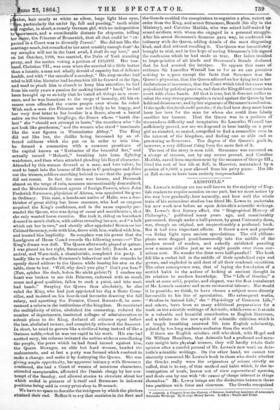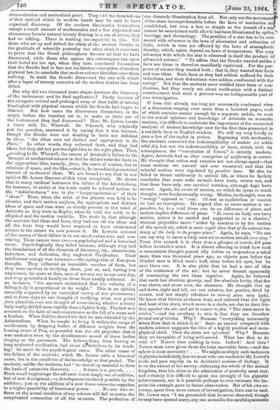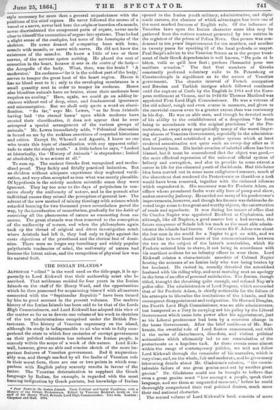. ARISTOTLE.*
Ma. Lewes's writings are too well known to the majority of Eng- lish readers to require mention on our part, but we must notice by the way how gradually, how naturally, and how well the whole train of his antecedent studies has fitted Mr. Lewes to undertake his new work now before us upon Aristotle's scientific writings. Mr. Lewes's first literary effort, the " Biographical History of Philosophy," published many years ago, and considerably patronized, though under a half-protest, by great University dons, was, though an original, not unquestionably a profound, book. But it had two important effects. It threw a new and popular —a living light upon ancient speculations. The old philoso- phers were dragged good-humouredly into the middle of the modern crowd of readers, and nakedly exhibited puzzling over common riddles just as we might puzzle over them our- selves now. No wonder the dons were half-puzzled ! The book fell like a rocket full in the middle of their symbolical caps and gowns, and exploded in mid dust of all their academic sanctities. The other consequence was, that of laying the foundation of a settled habit in the author of looking at ancient thought in its relation to modern knowledge. The " Life of Goethe," a work at once solid, popular, and elegant, was the first instalment of Mr. Lewes's inaturer and more substantial labours. Nor would it be possible, we think, to have chosen a subject more directly favourable to his line of speculation. His subsequent works, " Studies in Animal Life," the " Physiology of Common Life,". and others, have been so many additional preparatio:ia for a work on the scientific writings of Aristotle, which even as it stands is a valuable and beautiful contribution to English literature, and a tribute to the new spirit of scientific criticism which is at length breathing renewed life into English scholarship, palsied by too long academic seclusion from the world.
If there are English scholars still who think, with Hegel and Sir William Hamilton, that Aristotle had a profound and accu- rate insight into physical science, they will hardly retain their opinion after a careful perusal of Mr. Lewes's new work on Aris- totle's scientific writings. On the other hand, we cannot too sincerely commend Mr. Lewes's book to those who doubt whether the Greeks really were the originators of science strictly so called, that is to say, of that method and habit which, in the in- vestigation of truth, leaves out of view supernatural agencies, and deals one by one with "the causes of change inherent in things themselves." Mr. Lewes brings out the distinction between those two positions with force and clearness. The Greeks recognized * Aristotle. A Chapter from the History of Science, including Analyses of Aristotle's Scientifia Writings. By George Henry Lewes. London : Smith and Elder.
demonstration and methodized proof. They li il the foundations of that method which in modern hands may be said to have organized discovery. Of the modern discoveries themselves, except a small amount of mathematics and a few disjointed and elementary facts in natural history floating iu a sea of errors, they had no inkling. There is nothing incompatible in this. Yet those who set up and defend the claim of the ancient Greeks to the gratitude of scientific posterity too often think it necessary to prove that the Greek philosophers foresaw all that we have discovered, while those who oppose this extravagant tax upon their belief are too apt, when they have convinced themselves that the Greeks had in fact not the faintest conception of modern physical law, to conclude that modern science therefore owes them nothing. In truth the Greeks discovered the axe with which after a lapse of twenty centuries all the modern timber has been felled.
But why did two thousand years elapse between the discovery of the instrument and its final application ? Partly because of the energetic revival and prolonged sway of that habit of mixing theological with physical causes which the Greeks had begun to distrust. But how came the discoverers themselves, in the origin before the reaction set in, to make so little use of the instrument they had discovered ? Here Mr. Lewes breaks a lance with Dr. Whewell. Dr. Whewell, who originally put the question, answered it by saying that it was because, though the Greeks were not wanting in facts nor deficient in ideas, " the Ideas were not distinct and appropriate to the Facts." In other words, they collected facts, and they had ideas, but they did not put the right idea in the right place. Thus, recording to Dr. Whewell, the reason of Aristotle's failure in his Item pts at mechanical science is that he did not refer the facts to the appropriate idea, namely, force, the cause of motion, but to relations of space, and the like,—that is, he introduced geometrical instead of mechanical ideas. We are bound to say that in our opinion Mr. Lewes disposes of this view completely. He shows that in many cardinal instances the failure of the Aristotelians, for instance, to arrive at the truth could be referred neither to the " indistinctness " nor to the "inappropriateness" of their "ideas." Thus, when the orbit of the planets was hold to be circular, and their motion uniform, the appropriate and distinct ideas of space and time were as vividly present to the mind of Aristotle as they were to Kepler, when he held the orbit to be elliptical and the motion variable. The truth is, that although the ancients had ideas and facts, they had not all the ideas and all the facts they would have required to have constructed science to the extent we now possess it. Mr. Lewes's account of the causes of their failure is to our mind exhaustive and con- vincing. These causes were two,—a psychological and a historical cause. Psychologically they failed because, although they laid the foundations of all the elements of discovery, viz., observation, induction, and deduction, they neglected Verification. Their intellectual energy was immense,—the spring-tido of European thought. They collected an incredible number of facts, but they were careless in verifying them, just as, and, having less experience, far more so than, men of science are in our own day, and they generalized hastily on these facts hastily collected. As an instance, "the ancients maintained that the velocity of a falling body is proportional to its weight." This is an opinion naturally suggested by an unverified survey of the phenomena ; and in those days no one thought of verifying what was prima facie plausible,—no one thought of ascertaining whether a heavy body really did fall more rapidly than a lighter body. The fact was assumed on the faith of such experiences as the fall of a stone and a feather. When Galileo denied the fact he was ridiculed by the Aristotelians. When he sought to bring it within the range of verification by dropping bodies of different weights from the leaning tower of Pisa, so powerful was the old prejudice that it was unshaken even by the simultaneous sound of these bodies ringing on the pavement. The Aristotelians, from having so long neglected verification, had come to*disbelieve in its teach- ing! So much for the psychological cause. The other cause of the failure of the ancients, which Mr. Lewes calls a historical cause, lies in the condition of the knowledge at that period. The ancients, unlike the moderns, had " no stored-up material to form the basis of extensive discovery. . . . Science is a growth. . . . From small beginnings the advance is not simply one of addition, but of new development,—a development rendered possible by the addition ; just as the addition of a new tissue raises the organism to a higher possibility of functional power. . . . No one who re- flects on the actual condition of any science will fail to notice the complicated connection of all the sciences. The perfection of
one demands illumination from all. Not only are the movement of the stars incomprehensible before the laws of mechanics ar established, but even a fact so simple as the transit of a sta cannot be ascertained until after it has been illuminated by optics, \ barology, and thermology. The position of a star has to be esti- mated with reference to the laws of aberration and refraction of light, which in turn are affected by the laws of atmospheric density, which, again, depend on laws of temperature. The very telescope with which the star is observed is itself the product of advanced science." "To affirm that the Greeks wanted neithe r facts nor ideas is therefore manifestly equivocal. For the pur- poses of science they wanted both ; that is, they wanted true facts and true ideas. Such facts as they had seldom sufficed for their inductions, and their deductions were seldom confronted with the reality." Not that the ancients never verified their facts or con- clusions, but they rarely set about verification with a distinct consciousness that such a process was an indispensable part of true investigation.
If from this already too long yet necessarily condensed view of a discussion ranging over more than a hundred pages, each of which contains matter enough for a separate article, we turn to the actual opinions and knowledge of Aristotle on scientific matters, it is difficult to underrate the importance of the connected analysis of ancient knowledge now for the first time presented in a readable form to English readers. We will try very briefly to pass a few of the topics in review. Beginning with mechanics, the ancients conceived the indestructibility of matter (ex nihilo nihil fit), but not the indestructibility of force, which, with its consequence, the "correlation of forces," is strictly modern.
Again, Aristotle had no clear conception of uniformity in nature.
He thought that action and reaction are not always equal—that some motions are natural and some unnatural, and that the celestial motions were regulated by peculiar laws. So also he failed to detect uniformity in animal life, as where he facilely concludes that some male animals have teats, others not, and that lions have only one cervical vertebra, although dogs have several. Again, his views of motion, on which he spent so much thought, were fundamentally wrong. Motion, he thought, was an " energy " opposed to " rest. Of rest as equilibrium or tension he had no conception. He argued that in vacuo motion is im- possible, for in a void there can be no difference of place, and motion implies difference of place. "In vacuo no body can have motion, unless it be carried and supported as in a chariot whereas projectiles move "either by reaction or by the motion of the moved air, which is more rapid than that of the natural ten- dency of the body to its proper place." Again, he says, "No one can say why in vacuo a body once set in motion should ever stop." From this remark it is clear that a glimpse of inertia did pass before Aristotle's mind. It is almost affecting to think how such a momentous thought passed idly before so stupendous a mind more than two thousand years ago, as objects pass before the blinded man in blind man's buff, close before his eyes, but he sees them not. It is also plain that he had a sort of idea of the resistance of the air; but he never dreamt apparently of connecting the two ideas together. Again, he believed that earth has absolute gravity, and fire absolute levity, that fire rose above, and swam over, the elements. He thought that up and down, right and left, are not relative, but positive, fixed by nature, and not simply relations to us—oto laves srpbs He knew that friction produces heat, and inferred that the light and heat of the stars, which move in a circle, are due to their fric-
tion against the air, and air is nearer to fire. "The stars move in
circles,"—and his corollary to this is that they are therefore formed out of circles. Why ? Because " everything necessarily arises from that in which it is." Such an answer compared with modern science suggests the idea of a highly poetical and meta- physical child. Then the stars are spherical. Why ? Because they are incapable of being self-moved. What has that to do with it? Nature does nothing in vain. Indeed ! And then ? Nature must have given them the least moveable form,—and the sphere is least moveable ! . . . We might multiply such instances in physics indefinitely,but we must refer our readers to Mr. Lewes's book, and pass rapidly on to Aristotle's notions of biology. It is on the extent of his survey, embracing the whole of the animal kingdom, that his claim to the admiration of posterity must rest, and certainly it is difficult to speak too strongly of his gigantic achievements, nor is it possible perhaps to over-estimate the im-
pulse his example gave to future observation. But of his own ac- curacy, apart from mere extent of investigation, little can be said. Mr. Lewes says, "1 am persuaded that he never dissected, though be may have opened many, any one animal in the careful systematic style necessary for more than a general acquaintance with the positions of the chief organs. He never followed the course of a vessel or a nerve, never laid bare the origin or insertion of a muscle, never discriminated the component parts of organs, never made clear to himself the connection of organs into systems. Thus hehad a slight sense of the analogies, but none of the homologies of the skeleton. Ho never dreamt of comparing bone with bone, muscle with muscle, or nerve with nerve. He did not know the existence of the muscles. He knew a little of two or three nerves, of the nervous system nothing. He placed the seat of sensation in the heart, because it was in the centre of the body— the Acropolis of the body. What, then, was the brain ? 'A moderator.' Its coolness—' for it is the coldest part of the body,' serves to temper the great heat of the heart region. Hence it has no blood sent to it ; only to the enveloping membranes is a small quantity sent in order to temper its coolness. Hence also bloodless animals have no brains, since their moderate heat requires no cooling." Here, again, we could go on adding in- stances without end of deep, utter, and fundamental ignorance and misconception. But we shall only quote a word on classi- fication. " So far," says Mr. Lewes, " so far from Aristotle having laid ' the eternal bases' upon which moderns have erected their classification, it does not appear that he ever attempted a 'special arrangement of the various groups of animals." Mr. Lewes immediately adds, " Polemical discussion is forced on me by the reckless assertions of respected historians and critics. Except Dr. Whewell and Agassiz, I know no one who treats this topic of classification with any apparent solici- tude to state the simple truth." A little before lie says, " Looked at historically, the ' History of Animals' is stupendous ; looked at absolutely, it is no science at all."
To sum up. The ancient Greeks first recognized and metho- clized proof. They feebly and fitfully practised induction. But as children without adequate experience they neglected verifi- cation, and very often accepted as true what was merely plausible. Of hypothesis in the strictly modern scientific sense they were ignorant. They lay too near to the days of polytheism to con- ceive clearly the uniformity of nature, and in the pursuit after individual causes they missed the perception of general law. The advent of the new method of mixing theology with science which retarded learning for two thousand years nevertheless paved the way, by the introduction of monotheism, gradually for the habit of .conceiving all the phenomena of nature as emanating from one source. The great obstacle was thus removed to the conception 'of the uniformity of nature, and when the philosophers again took up the thread of original and direct investigation much where Aristotle had left it, they had only to fight against the caste objections of the priesthood and the clerical lust of domi- nion. There were no longer any hereditary and widely popular polytheistic tendencies of mind, the uniformity of nature had become the latent axiom, and the recognition of physical law was its natural fruit.
































 Previous page
Previous page